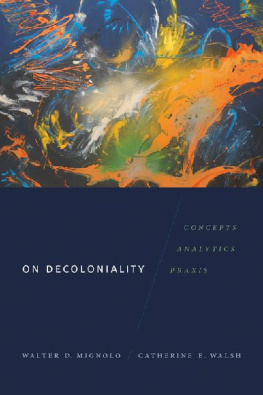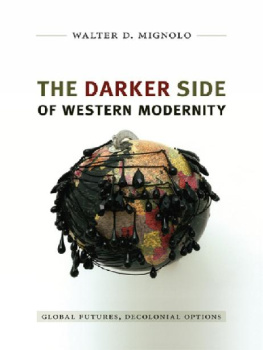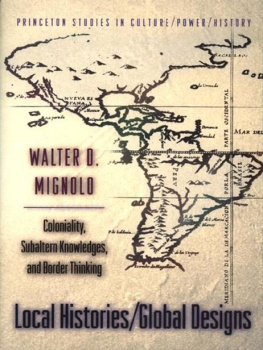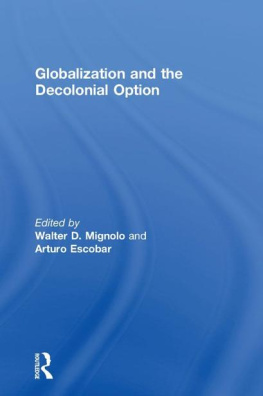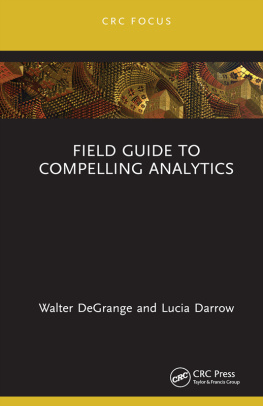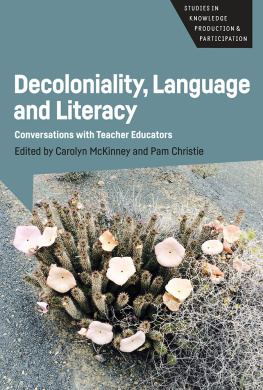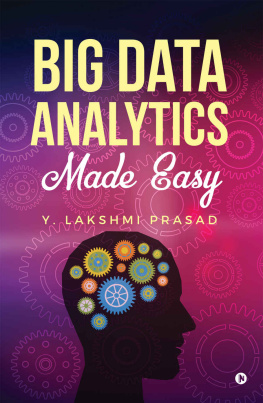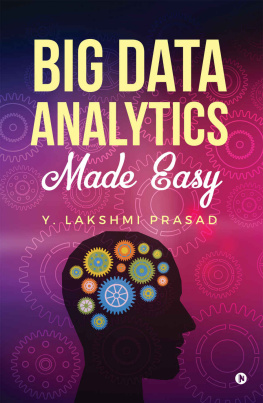On Decoloniality interconnects a diverse array of perspectives from the lived experiences of coloniality and decolonial thought/praxis in different local histories from across the globe. The series identifies and examines decolonial engagements in Eastern Europe, the Caribbean, the Americas, South Asia, South Africa, and beyond from standpoints of feminisms, erotic sovereignty, Fanonian thought, post-Soviet analyses, global indigeneity, and ongoing efforts to delink, relink, and rebuild a radically distinct praxis of living. Aimed at a broad audience, from scholars, students, and artists to journalists, activists, and socially engaged intellectuals, On Decoloniality invites a wide range of participants to join one of the fastest-growing debates in the humanities and social sciences that attends to the lived concerns of dignity, life, and the survival of the planet.
A SERIES EDITED BY
Walter Mignolo & Catherine Walsh
On Decoloniality
CONCEPTS
ANALYTICS
PRAXIS
WALTER D. MIGNOLO
and
CATHERINE E. WALSH
DUKE UNIVERSITY PRESS Durham and London 2018
2018 Duke University Press
All rights reserved
Printed in the United States of America on acid-free paper
Designed by Matt Tauch
Typeset in Minion Pro by Westchester Publishing Services
Library of Congress Cataloging-in-Publication Data
Names: Mignolo, Walter, author. | Walsh, Catherine E., author.
Title: On decoloniality : concepts, analytics, praxis / Walter D. Mignolo and Catherine E. Walsh.
Description: Durham : Duke University Press, 2018. | Series: On decoloniality | Includes bibliographical references and index.
Identifiers: LCCN 2017053249 (print) | LCCN 2017056840 (ebook)
ISBN 9780822371779 (ebook)
ISBN 9780822370949 (hardcover : alk. paper)
ISBN 9780822371090 (pbk. : alk. paper)
Subjects: LCSH : PostcolonialismPhilosophy. | DecolonizationPhilosophy. | ImperialismPhilosophy. | Power (Social sciences)Philosophy. | Civilization, ModernPhilosophy.
Classification: LCC JV 51 (ebook) | LCC JV 51 .M 544 2018 (print) | DDC 325/.301dc23
LC record available at https://lccn.loc.gov/2017053249
Cover art: Adolfo Albn Achinte, Marejada, de la serie Andanias
TO AN BAL QUIJANO / who gave us, and the world, the concept of coloniality.
In memory of Fernando Coronil. And in celebration of the 2016 Standup resurgence at Standing Rock.
Contents
Catherine expresses her gratitude to all those who have formed part of the conversation on modernity/coloniality/decoloniality over more than twenty years. Recalled are the gatherings in various moments and contexts, of those friends and colleagues associated with what has been referred to as the modernity/(de)coloniality group, project, or collective, particularly in its early formations in Latin America and the United States.
My thanks to Anbal Quijano for introducing and pushing reflection on the coloniality of power; to Enrique Dussel for making so clearly visible modernitys distinct moments and global vision, and to Walter Mignolo for illuminating modernity as colonialitys darker side and, of course, for assembling us together. My thanks to Edgardo Lander for concretely bringing to the fore the coloniality of both nature and knowledge; to Nelson Maldonado-Torres, for his meditations on the coloniality of being, his philosophical clarity and force, and his decolonial sensibilities; and to Arturo Escobar for his continuous sentipensar . My thanks as well to Fernando Coronil (who lives on in our minds and hearts), Santiago Castro-Gmez, Javier Sanjins, and Pablo Quintero for their multiple contributions and spaces-places of thought, and Adolfo Albn for his embodied re-existence. A special acknowledgment and recognition to Zulma Palermo, Maria Lugones, Freya Schiwy, and more recently Mara Eugenia Borsani, Rolando Vzquez, Yuderkys Espinosa, and Rita Segato, whose voices, writings, and thoughts have not only unsettled male centrality, but more importantly, and each in their own way, have pressed for depatriarchalizations in modernity/(de)colonialitys conception, comprehension, praxis, and project. Of course, there are many more from newer generations to recognize and thank, including in other continents of the globe; the list is much too long to include here.
I would be remiss if I did not acknowledge the significance of our doctoral program-project in Latin American (Inter)Cultural Studies at the Universidad Andina Simn Bolvar in Quito. Since its beginnings in 2001, this program-project has deepened collective reflections on the modern-colonial matrix of power, and served as a sort of seedbed of and for decolonial praxis, now reflected in collectives, programs-projects, and knowledge production throughout South and Central America.
Finally, I wish to express my gratitude to the collectives, movements, communities, and activist-intellectuals who, from the different territories, subjectivities, and struggles of Abya Yala, and from the borders, margins, and cracks of the modern/colonial/capitalist/heteropatriarchal order, are planting seeds of life that counter the project of violence, dispossession, war, and death that characterizes the present times. Thank you as well for the possibility, in some cases, of being part of the struggles, conversations, and reflexive praxis, and, in others, of being able to dialogue and/or think with.
Walter expresses his gratitude to all those who have made possible the structure and arguments of has therefore a long story and substantial debts.
Chronologically, my first debt is to Gregory Lee, former director of the Hong Kong Advanced Institute for Cross-Disciplinary Studies ( HKAICS ) at the City University of Hong Kong. The four public lectures delivered there and titled Spirit Returns to the East were a key experience in conveying the meaning of coloniality to an audience dwelling in different temporalities. My second debt is to Dilip Menon, director of the Center for Indian Studies in South Africa ( CISA ), at Wits University, Johannesburg. It was a second opportunity to address, during one month (August 2013) and in four lectures titled Decolonial Thought, an audience familiar with colonialism no doubt but less familiar with the conceptual specificities of coloniality and coloniality of power unfolded after Anbal Quijano introduced the concept in the 1990s.
I owe an even larger debt to Professor H. B. Geyer, director of Stellenbosch Institute for Advanced Study ( STIAS) . His invitation to enjoy and take advantage of STIAS s wonderful research atmosphere, during two periods of six weeks in JulyAugust of 2014 and 2015, allowed me to write the first and last draft of the second part as it appears here, and that were based on the previous lectures delivered at HKAICS and CISA . During that period I rehearsed the main ideas of my part, presenting them to the STIAS fellows and in a conversation with faculty and graduate studies organized by Nick Shepherd, director of the Centre for African Studies, at the University of Cape Town. Nick announced the workshop as a conversation On Decoloniality. At Cape Town, I met Daniela Franca Joffe, whose editorial skill and familiarity with understanding of decolonial sentiments in Southern Africa were extremely helpful in streamlining the argument.
Thanks to Rolando Vzquez for his camaraderie and constant conversations to organize and run the Middelburg Decolonial Summer School since summer 2010; and to the crew of the summer school, with whom in the classroom and outside of it, conversations on modernity, coloniality, and decoloniality never stop. They are Jean Casimir, Maria Lugones, Madina Tlostanova, Rosalba Icaza, Ovidiu Tichindeleanu, Jeannette Ehlers, Patricia Kaersenhout, and Fabian Barba.

